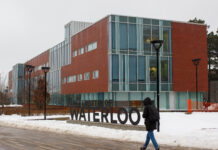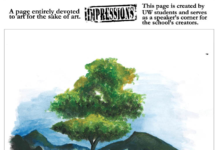The Federation of Students invited the four Waterloo mayoral candidates to a debate on Oct. 20. The event was moderated by <em>Imprint</em> news editor Antonio Brieva and hosted by Feds VPED Stéphane Hamade.
All four candidates arrived to discuss their platforms, public transportation, and the current situation with Schembri Property Management at One Columbia in an interview with <em>Imprint</em>.
Current mayor Brenda Halloran is not seeking re-election, and all four candidates have no previous political experience. Candidates include Dave Jaworsky, Dave MacDonald, Rami Said, and Erika Traub.
MacDonald began his opening remarks by saying that previous student turn out was low and that he hoped the event would help turn that around.
The debate began with a discussion on keeping the human capital of students in Waterloo, followed by a lengthy discussion on public transportation.
“I think it was really great to see the candidates interact with each other and for students to ask them questions afterwards,” Hamade said after the event.
Hamade expressed interest in holding a similar debate for the next federal election in 2015.
<strong>Cycling</strong>
Traub pushed for segregated bike lanes during a question on how to improve cycling safety. “It’s too dangerous in Waterloo to ride a bike, putting bike lines on the road does not solve the problem,” she said. MacDonald, however, pushed for cycling education, saying: “We need to educate the cyclists and find a way to make the roadways safer for them.”
Said advocated for diverting cyclists to side roads and paths, and accused candidates in favour of lanes of making “empty promises” if they promised segregated lanes. Hamilton recently implemented segregated bike lanes at a cost of $400,000 per kilometer and both Said and Jaworsky did not believe it was financially feasible for Waterloo to install these lanes. “The taxpayers are already overburdened… I’d be a little reluctant to spend $400,000 a kilometer on segregated bike lanes right now,” Jaworsky said.
<strong>Human Capital</strong>
Said blamed “red tape” around Waterloo City Hall for preventing business from opening in Waterloo. He said that it would take him 10 minutes to register a business online and the same process would take months in Waterloo.
Jaworsky credited his time with BlackBerry (formerly Research in Motion) with increasing the co-op tax credit for employers sixfold to help attract co-op students.
MacDonald said that Conestoga College trades’ graduates are the biggest job creators in the region and that he would look for a more streamlined business creation policy to allow them to set up shop in Waterloo.
<strong>Housing</strong>
Candidates debated the feasibility of reducing developmental costs versus providing grants for low-income housing development.
MacDonald would like to eliminate developer charges. Said similarly wanted to give grants to reduce developer costs for low-income housing.
Said particularly advocated for the elimination of ghettos, student or otherwise, as a strategy to pursue.
After the debate, the candidates were also asked about what they would have done about the Schembri situation had they been in office and how they would suggest the mayor’s office make sure students are better informed about their rights as tenants.
Jaworsky promised a mayor’s task force on affordable housing which he later said would “take into account all issues, from seniors’ housing, to people just getting on their feet, and including student housing. They’ll come to a strategy so that things like this have less of a chance of ever happening again.”
Said replied, “I think we have to work with our provincial government. There’s a lot of laws that they have in force there that control those types of situations. … We are a student town and we have to protect our students.”
MacDonald made the point that the city should have been there to help provide alternative housing to the students affected, and Traub suggested that letters outlining renting information and tenant rights be included in students’ UW acceptance packages.
<strong>Public Transportation</strong>
Said, Jaworsky, and Traub all support the ION light rail transit (LRT), with MacDonald being the sole candidate in firm opposition.
MacDonald called the LRT a “bad deal for the taxpayers” and suggested that the entire ION project be axed in favour of bus rapid transit (BRT). “ION is not rapid,” he said, saying that one of the main reasons for the LRT is the intensification of downtown and not moving people. “We’re still too small to be looking at LRTs,” MacDonald concluded. The iXpress qualifies as rapid bus transit, and similar systems are used in Brampton and Ottawa.
Candidates agreed on the need for greater GO train service in the area. While Said noted that Ontario Premier Kathleen Wynne made a commitment to bring two-way service to the Kitchener line (currently, there are only two trains that run from Kitchener to Union Station in downtown Toronto in the morning and two on the reverse trip back to Kitchener), Jaworsky believed that his experience in advocacy would keep the project alive.<br />
<strong>Student Engagement</strong>
As a final closing topic, candidates shared their views on increasing student engagement in municipal affairs.
Jaworsky stressed the important of having a “mentoring relationship” with the Federation of Students and students becoming Waterloo residents for life. “I hope that you, as students, consider spending your life here,” he said.
MacDonald had strong words for voters: “You’re letting your parents and your grandparents make all your decisions for you if you don’t vote.”






























